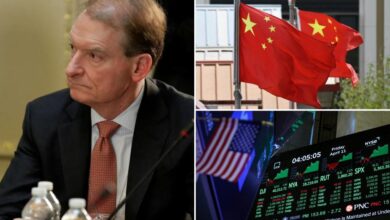Trump Adds Tariff Exemptions for Smartphones, Computers and Other Electronics

Following a series of tariff escalations on Chinese imports by the Trump administration, a recent rule issued on Friday spared certain electronics such as smartphones, computers, and semiconductors from additional fees. This move provides relief for tech companies like Apple and Dell, as well as consumers who could have faced higher prices on products like iPhones and other consumer electronics.
The exclusions listed by U.S. Customs and Border Protection would apply to a range of technology goods, including modems, routers, and flash drives, which are not primarily manufactured in the United States. While this exemption is significant, it does not eliminate all tariffs on electronics and smartphones, as other levies still apply. The Trump administration has previously imposed a 20 percent tariff on Chinese goods and may consider increasing tariffs on semiconductors in the future.
These exemptions mark a key development in the ongoing trade tensions between the U.S. and China, with implications for the tech industry and the broader economy. Companies like Apple and Nvidia stand to benefit from reduced taxes, potentially avoiding profit losses. Consumers can also expect to see stable prices on electronic devices, averting potential inflation and economic turmoil.
The decision to exempt certain electronics from tariffs represents a shift in the Trump administration’s trade policy, aimed at supporting U.S. manufacturing. The majority of factories producing electronics are located in Asia, particularly in China, making a relocation unlikely without significant incentives such as steep tariffs.
While the exemptions apply to all countries, not just China, the relief for the electronics industry may be short-lived. The administration is preparing for another trade investigation, this time focusing on semiconductors, which could lead to additional tariffs on related products. Maintaining a stable supply of semiconductors is crucial for various industries, including smartphones and automobiles.
The ongoing efforts to reshape global trade have sparked uncertainty in the tech sector, with companies like Apple navigating complex trade dynamics to protect their supply chains and pricing strategies.
The recent tariff exemptions signal a partial easing of tensions in the U.S.-China trade war, offering relief to various industries heavily reliant on Chinese imports. The exemptions cover a significant portion of U.S. imports from China and could benefit other Asian countries as well.
Despite the temporary reprieve, the unpredictable nature of trade relations poses ongoing challenges for businesses and consumers. The fluctuating tariffs and retaliatory measures underscore the complex interplay between economic policies and global supply chains.
As the situation continues to evolve, companies like Apple face strategic decisions on manufacturing locations and pricing strategies to navigate the changing trade landscape.
The recent developments in trade policy reflect a delicate balancing act between economic interests and geopolitical considerations. The exemptions granted to certain electronics underscore the interconnectedness of global trade and the challenges of reshaping established supply chains.
As the U.S. and China continue to navigate trade tensions, businesses and consumers alike must adapt to the evolving landscape of tariffs and trade agreements.
The tech industry, in particular, remains at the forefront of these changes, requiring nimble responses to shifting trade policies and economic dynamics.
The recent tariff exemptions highlight the complexities of global trade relations and the need for strategic responses to evolving economic challenges.
As businesses and policymakers navigate the shifting landscape of tariffs and trade agreements, proactive measures are essential to mitigate risks and capitalize on emerging opportunities.
The ongoing dialogue between the U.S. and China will continue to shape the global economic landscape, with implications for businesses, consumers, and economies worldwide.
The evolving trade dynamics underscore the interconnected nature of the global economy, requiring strategic responses to mitigate risks and leverage opportunities.
As businesses adapt to changing trade policies and economic landscapes, agility and foresight are crucial for navigating the complexities of international commerce.
The ongoing dialogue between the U.S. and China serves as a reminder of the intricate web of trade relations that shape the modern world, with far-reaching implications for industries, markets, and consumers.





